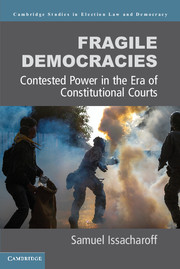Book contents
4 - Responses to Antidemocratic Threats
from PART I - MILITANT DEMOCRACY
Published online by Cambridge University Press: 05 July 2015
Summary
Until quite recently, most scholarly discussions of the restrictions on antidemocratic groups began (and many of them ended) with the question of whether a democracy ever has the right to impose viewpoint constraints on extreme dissident views. Professors Gregory Fox and Georg Nolte, for example, in their important contribution to the debate, primarily focused on the possibility of restricting political participation consistent with international law, particularly the guarantees of the 1966 International Covenant on Civil and Political Rights. The responses to Professors Fox and Nolte did not question their analytic framework; instead, they simply challenged the capacity of any society to police the boundaries of something as nebulous as “democracy” and questioned whether the remaining product was worthy of the name:
If one is to say to the people, in essence, “The fundamental principle of democracy dictates that you can have any government except the one the majority of you presently think you want,” there had better be a more compelling argument for democracy than that it enables the people to choose. There is nothing intrinsically valuable about choosing among undesired options.
Although these critiques take a back seat to claims that suppression does not work, all of these arguments tend to lump together the different sorts of responses that might be deployed against antidemocratic threats. More recently, however, “consensus has emerged on the fundamental principle underlying the theory and practice of militant democracy: Democracies have a right … to limit fundamental rights of free expression and participation – albeit with various qualifications and caveats – for reasons of self-preservation.” The idea that every political viewpoint is entitled to participate in the political arena “has virtually no supporters today.” Even staunch advocates of protecting political parties such as Nancy Rosenblum acknowledge that there are times when, quite simply, “the facts justify banning” a party.
Rather than questioning whether prohibitions of antidemocratic forces are ever possible, it is more fruitful to begin by focusing on what kinds of prohibitions are permissible and under what circumstances.
- Type
- Chapter
- Information
- Fragile DemocraciesContested Power in the Era of Constitutional Courts, pp. 77 - 99Publisher: Cambridge University PressPrint publication year: 2015

